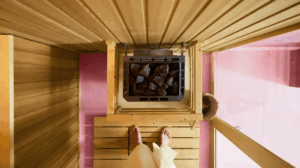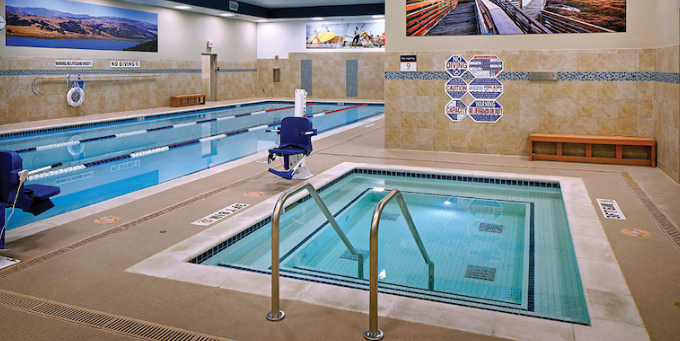In the debate over the health benefits of sauna vs hot tub, it is clear that both provide a calming haven that enhances both mental and physical well-being. Hot tubs and saunas are becoming popular forms of heat treatment due to our need for rest, well-being, and renewal. But which one is the best in terms of health benefits?
We compare the special qualities of saunas and hot tubs and examine the wide range of health benefits they offer as we find into the world of self-care. Explore the benefits of sauna vs hot tub, learn which heat treatment option would be ideal for you, and experience pain relief, increased circulation, stress relief, and greater mental well-being.
Table of Contents
What is a sauna?
A sauna is a small, tightly insulated room or house that has a heater, stove, fireplace, or other heat-producing device. Saunas may be classified into two primary categories: Traditional dry saunas and infrared saunas, which use infrared heaters to provide heat. Traditional saunas are found in many other nations as well, even though they are frequently connected to Finnish culture.
Benefits of a sauna

People who spend a little time in the sauna room increase their wellness all over the world. Saunas provide the following health benefits, so a little time in one may refresh both our bodily and mental states.
- Protecting against disease: The heat from a sauna boosts the formation of white blood cells, which fights disease and eliminates infections. There are fewer cases of the flu and colds.
- Improved skin: We may cleanse our skin by using saunas. This occurs when our body begins to perspire, washing away bacteria and improving the state of our skin by replacing dead skin cells.
- Removal of pollutants: Saunas have the benefit of detoxification over hot tubs. Sweating may be caused by the high temperatures in a sauna, which helps wash the skin of some of those unwanted chemicals. Hot tubs don’t offer the same detoxifying benefits because they use water instead of dry heat.
- Cosmetics: Saunas have positive effects on skin appearance. The heat from saunas helps open pores and exfoliate dead skin cells, which has been related to cleaner, healthier-looking skin.
- Aromatherapy: Aromatherapy is an extra option for sauna use. The dry heat of a sauna may help to release the smell of essential oils, which may have therapeutic effects. Because hot tubs contain water instead of just dry heat, aromatherapy is not as effective there.
- Safety: Saunas could be a more secure substitute for hot tubs. Hot tubs may pose safety concerns because of the water they contain, which increases the possibility of accidental drowning or slips and falls. Saunas remove these risks with their dry heat and lack of water.
What is a hot tub?
A hot tub is a large spa that can be set up indoors or outdoors, including massage streams and hot water. Hot tubs are often made of fiber or plastic and can fit many people at once. Running costs for hot tubs are higher than for saunas.
Benefits of a hot tub

Using a hot tub weekly offers significant health benefits.
- Heart rate: Many research shows taking regular hot tub baths reduces blood pressure. Relaxing in a hot tub reduces stress on the heart, it is suggested for those who have heart problems.
- Blood sugar levels: Taking a hot tub bath has health benefits equal to those of exercise, and it is an excellent activity for those who have type 2 diabetes. Taking a half-hour hot tub absorption six days a week may lower blood sugar levels by almost 10% after a month.
- Hydrotherapy: Saunas do not offer hydrotherapy massages, but hot tubs do. Many hot tubs contain jets that act on the body like a massager, relieving pain and tension in the muscles. Saunas and typical hot tubs are not the same when it comes to hydrotherapy massage.
- Better digestion: There might be benefits for the digestive system as well from taking a hot tub bath. Because it calms the stomach and intestines, some people discover that taking a hot tub bath helps in better digestion. Saunas are not as beneficial to the digestive system.
- Lack of weight: Relaxing in a hot tub also means that you may float gently on the water’s surface. Because the weightlessness of a hot tub reduces stress in the body’s joints and muscles, it is beneficial for people who suffer from joint stiffness brought on by arthritis and other ailments.
- Superior design: Hot tubs may be designed with luxury. A hot tub may be an expensive addition to any home, depending on its size and style. An outdoor sauna may not be as visually appealing as a hot tub due to its small size and simple design. It is feasible to have an indoor sauna, but it requires a whole room in your home.
Similarities Between Hot Tubs and Saunas
A long and connected therapeutic history that crosses time and space, firmly establishing them in several cultural traditions around the globe, combines saunas and hot tubs. Heat has been used for healing purposes for thousands of years.
- Saunas origin are in Northern Europe, namely in Finland, where its usage was not limited to safe practices; it was also a highly valued social activity and a place where the ill might be healed. It was formerly thought that the body and soul could be purified by the use of heat, steam, and occasionally scented plants, which improved general well-being.
- Hot tubs, also referred to as spas, have a long history in several cultures, most notably ancient Japan and Rome. Romans used public baths with hot tubs because they saw them as vital social and community areas that promoted rest and well-being. The practice of taking a hot spring bath, or “onsen,” is a fundamental cultural institution in Japan. It is said that naturally heated waters have beneficial properties that promote rest and renewal.
Common health benefits of Saunas and Hot Tubs
Reduction of Stress, Better Quality Sleep, pain reduction, increased circulation, detoxification, skin health, and recovery after exercise are among the usual health benefits of hot baths and saunas. They include benefits of Mental Health, Increased Immune System Performance, and Relief from Breathing Problems.
- Reduction of Stress: Making use of a sauna or a hot tub might be an effective way to reduce stress. Physical tension is released when tense muscles are relaxed in a warm, comforting environment. They also offer a peaceful area free from daily pauses for mental rest. This kind of combined mental and physical relaxation may help in lowering stress levels all around.
- Better Quality Sleep: These heat therapies encourage relaxation, which can greatly enhance the quality of sleep. Your body relaxes and becomes calmer in response to the heat, which promotes restful sleep. Those who suffer from sleeplessness problems might especially benefit from this.
- Pain Reduction: Saunas and hot tubs may be powerful tools to control pain. Heat and improved circulation provide relief from a variety of pains, such as arthritis, joint pain, aches in the muscles, and chronic pain. The warm surroundings help with muscular relaxation, lowering soreness and stiffness.
- Enhanced Blood Flow: The widening of blood vessels caused by vasodilation, or heat-induced blood vessel dilatation, is enhanced blood flow throughout the body in saunas and hot tubs. Better circulation has a positive impact on many aspects of health, including skin and heart health.
- Detoxification: Saunas and hot tubs both encourage proper sweating, which is one of the body’s main ways of getting rid of toxins. The removal of toxins from the body by detoxification may enhance overall health and well-being.
- Skin Disease: These heat treatments cause the skin to sweat and become hot, which helps clear pores and remove impurities and dirt. Deep cleaning can enhance skin health and produce skin that is cleaner and more colorful.
- Recovery After Exercise: Hot tubs and saunas are popular choices among athletes for post-workout recovery. A faster return to training is possible because of the heat’s ability to ease muscular tension, lessen stiffness, and accelerate the healing process.
- Benefits of Mental Health: Using a hot tub or sauna has benefits for emotional and physical well-being that go past physical health. Using heat treatment regularly can improve mood, reduce symptoms of anxiety and depression, and enhance mental health in general.
- Increased Immune System Performance: Saunas and hot tubs can help improve blood circulation and lower stress levels, which can strengthen the immune system. Stress reduction promotes a more powerful immune response, and improved circulation enables the body to transfer immune cells more effectively overall.
- Relief from Breathing Problems: Sauna and hot tub steam has the potential to relieve several respiratory problems. People who suffer from allergies or asthma may find respite from their symptoms thanks to the warm, humid air’s ability to open up their airways and lessen blockage.
Potential Risks and Safety Measures

Although there are several health benefits associated with saunas and hot tubs, users should be informed of potential risks to guarantee a safe and happy use. Here are a few typical risks and safety measures related to each:
- Risk of Dehydration and Overheating: Continuously staying in a hot environment increases the risk of dehydration and overheating, which can cause heat exhaustion or heat stroke. In extreme circumstances, these disorders may result in insanity, nausea, and dizziness. Excessive heat can also rapidly dehydrate the body by causing water loss in the body. When using a hot tub or sauna, make sure you drink a lot of water before and after, and do not spend. Get out of the hot place right away if you begin to feel sick.
- Cleaning and Maintaining: To stop the formation of shapes or dangerous germs, hot tubs, and saunas need to be cleaned and maintained regularly. Before using any facilities, notably the hot tub filters, make sure they are clean and well-maintained.
- Alcohol Consumption: Avoid using a sauna or hot tub right before or right after drinking alcohol. Alcohol might make you less aware of the dangers of overheating and dehydration as well as make it harder for you to recognise them.
- Medication: Exposure to heat can interfere with some drugs, perhaps causing adverse effects. See your doctor about the potential risks of using a hot tub or sauna if you take any drugs.
- Supervision: Never use a sauna or hot tub by yourself. In the event of an emergency, always make sure someone else is present or aware of your activities.
Considering Maintenance and Installation

Installation and Maintenance of saunas
In comparison to hot tubs, saunas usually need less installation work. Installing them in a basement, spare room, or even outside is quite simple. Cleaning your sauna regularly, checking that the heating element is working properly, and replacing any worn-out parts are all part of maintenance. To maintain the sauna secure and functional, it is also necessary to regularly check for bacteria and high humidity levels.
Installation and Maintenance of Hot Tubs
Installing a hot tub involves more complex plumbing and electrical work. To guarantee safety and correct operation, it’s always essential to have an expert advise you during installation. Maintenance requires frequent cleaning of the tub, water purification, and testing of the pump and heater. To reduce energy loss and heat loss, proper insulation is essential.
The decision between a sauna and a hot tub ultimately comes down to lifestyle, demands, and personal preferences. While hot tubs give relaxation, stress alleviation, and better sleep, saunas offer detoxification, improved heart function, and muscular relaxation. Consider the benefits and drawbacks of each choice as well as maintenance needs.
Initial Cost
A sauna may be far more affordable than a hot tub, which can cost up to $35,000 in equipment, piping, and installation. Depending on the type you choose, the DIY sauna kits should only set you back about $7,000.
How do Saunas and Hot Tubs Work?
Warmth is how saunas and hot tubs promote recreational wellness. This can cause a rise in body temperature that resembles the physiological effects of moderate-intensity aerobic exercise, including enhanced mental clarity, better skin cleaning, and better circulation. Both hot tubs and saunas use heat treatment to reduce stress and ease aching muscles.
The health concerns associated with using either equipment are minimized by drinking lots of water. Remember that a hot tub needs a cover to keep its heat when not in use. Both work better in a naked sauna or hot tub to more effectively elevate body temperature at the core, and both benefit from a cold wash after treatment.
Sauna vs Hot Tub: Which Is Better?
While there is no question about the different benefits of both hot tubs and saunas, which is better?
Luxury products like saunas and hot tubs are very expensive. Establishing an outdoor sauna is less expensive than building an indoor one, although it is often more expensive than both. Though they are equal in cost to both saunas, hot tubs certainly are less expensive than swimming pools.
Depending on the model you select, installing and maintaining a hot tub may be rather costly. Cleaning and disinfection regularly are necessary to stop the formation of germs in the dirt trapped in the jets. For hygienic and clean conditions, you will also need to add chemicals and replace the water regularly.
This project may be expensive, particularly if you use your hot tub regularly. Because they don’t require you to constantly pour water over surfaces to create humidity, infrared saunas are easy to use and require no maintenance. They also require less time to warm up than a hot tub and have extremely high energy efficiency when in use.
Through ventilation, the intense heat may be used to help clear the inside, allowing the sauna to rid itself of any possible bacterial development and moisture. Even though they are equally pricey to buy, cleaning the dirt trapped in your hot tub will take more effort and time than cleaning a sauna.
Conclusion
The comparative analysis of sauna vs hot tub shows that both types of heat treatment offer exceptional health benefits. You can enjoy a variety of benefits such as pain relief, better sleep, detoxification, increased circulation, and stress relaxation when you bathe yourself in a sauna or the warm, floating atmosphere of a hot tub.
It is vital to take into account each plant’s distinct medicinal qualities and possible risks, even if they all have numerous health advantages in common. You may choose the choice that most closely matches your well-being objectives by making an informed selection based on your tastes, health issues, and the available resources.






